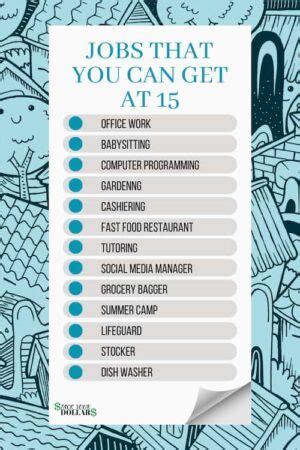Key Points:

- Understand child labor laws and restrictions
- Seek age-appropriate jobs that align with skills and interests
- Explore internships, apprenticeships, and volunteer opportunities
- Balance work and school responsibilities
- Build essential skills for future employment
Child Labor Laws and Restrictions
In the United States, the Fair Labor Standards Act (FLSA) establishes specific rules regarding youth employment. According to the FLSA:
- General Minimum Age: Individuals under 14 years old cannot be employed, except in limited circumstances such as family-owned businesses.
- Hazardous Occupations: Minors under 18 years old are prohibited from engaging in specific hazardous occupations, such as operating power tools or working in construction.
- Hours of Work: 14- and 15-year-olds can work a maximum of 8 hours per day and 40 hours per week during non-school hours.
Age-Appropriate Jobs for 15-Year-Olds:
- Retail Sales: Part-time positions in clothing stores, grocery stores, or department stores.
- Food Service: Server, busser, or cashier at restaurants or fast food chains.
- Customer Service: Answering phones, providing information, or greeting customers.
- Tutoring: Helping students with academic subjects.
- Babysitting: Caring for children in a safe and responsible manner.
Internships, Apprenticeships, and Volunteer Opportunities
Beyond paid employment, consider exploring internships, apprenticeships, and volunteer opportunities. These experiences can provide:
- Exposure to Different Industries: Gain insights into various careers and industries.
- Skill Development: Acquire valuable skills and knowledge relevant to future aspirations.
- Networking: Connect with professionals and build a network for future job opportunities.
Balancing Work and School Responsibilities
It is essential to maintain a healthy balance between work and school responsibilities. Follow these tips:
- Prioritize Schoolwork: Ensure school assignments and studies take precedence over work.
- Plan Ahead: Schedule work hours around school events, homework time, and extracurricular activities.
- Communicate: Inform employers about school commitments and request flexible scheduling if necessary.
Building Essential Skills for Future Employment
Working as a 15-year-old can foster invaluable skills that will benefit future employment:
- Responsibility: Develop a sense of accountability and responsibility for tasks.
- Communication: Improve communication skills through interactions with customers, colleagues, and supervisors.
- Time Management: Learn to manage time effectively and prioritize tasks.
- Teamwork: Collaborate with others to achieve common goals.
Why Matters and How Benefits
Working as a 15-year-old offers numerous benefits:
- Financial Independence: Earn money to save, spend, or contribute to family expenses.
- Skill Development: Acquire essential skills that enhance future employability.
- Experience: Gain valuable work experience that makes resumes stand out.
- Maturity: Foster personal growth and responsibility by taking on work responsibilities.
Common Mistakes to Avoid
When seeking employment as a 15-year-old, avoid these common mistakes:
- Working Illegally: Do not engage in work that violates child labor laws or safety regulations.
- Overworking: Ensure work hours do not interfere with school or personal well-being.
- Neglecting Studies: Prioritize schoolwork and do not let employment become a distraction.
- Accepting Unfair Treatment: Know your rights and do not tolerate unfair or exploitative treatment.
Step-by-Step Approach to Finding a Job
Step 1: Explore Options
Identify age-appropriate jobs in your community by researching online, asking family and friends, or visiting local businesses.
Step 2: Prepare a Resume and Cover Letter
Create a concise resume and professional cover letter that highlight your skills and experience.
Step 3: Apply for Jobs
Submit applications and resumes to potential employers. Follow up politely to inquire about the status of your application.
Step 4: Interview
Prepare for interviews by researching the company, practicing answers, and dressing appropriately.
Step 5: Accept and Start Work
Once you receive a job offer, review the terms of employment carefully before accepting. Arrive at work on time and be professional in your conduct.
Additional Tips:
- Seek support from parents, guardians, or teachers in your job search.
- Join youth organizations or participate in after-school programs that offer work experience opportunities.
- Consider expanding your job search to online platforms or freelance marketplaces.
- Be patient and persistent in your job search. It may take time to find a suitable position.
Conclusion:
Working as a 15-year-old can be a rewarding and beneficial experience. By understanding child labor laws, exploring age-appropriate jobs, and balancing work and school responsibilities, you can set yourself up for success in your future career. Remember to prioritize your education, acquire valuable skills, and avoid common pitfalls. With determination and a positive attitude, you can find a job that aligns with your aspirations and enriches your life.
Tables for Reference
Table 1: FLSA Minimum Age Requirements
| Age | Non-Agricultural Occupations | Agricultural Occupations |
|---|---|---|
| Under 14 | Prohibited | Prohibited |
| 14-15 | 8 hours per day, 40 hours per week | 10 hours per day, 40 hours per week |
Table 2: Age-Appropriate Jobs for 15-Year-Olds
| Job Type | Skills Developed |
|---|---|
| Retail Sales | Customer service, communication, teamwork |
| Food Service | Food preparation, sanitation, time management |
| Customer Service | Communication, empathy, problem-solving |
| Tutoring | Subject knowledge, teaching skills, patience |
| Babysitting | Childcare experience, responsibility, safety |
Table 3: Benefits of Working as a 15-Year-Old
| Benefit | Description |
|---|---|
| Financial Independence | Earning money for savings, expenses, or contributions |
| Skill Development | Acquiring valuable skills for future employment |
| Experience | Gaining practical work experience that enhances resumes |
| Maturity | Fostering personal growth and responsibility |
Table 4: Common Mistakes to Avoid
| Mistake | Description |
|---|---|
| Working Illegally | Violating child labor laws or safety regulations |
| Overworking | Interfering with school or personal well-being |
| Neglecting Studies | Prioritizing employment over schoolwork |
| Accepting Unfair Treatment | Tolerating unfair or exploitative treatment |
